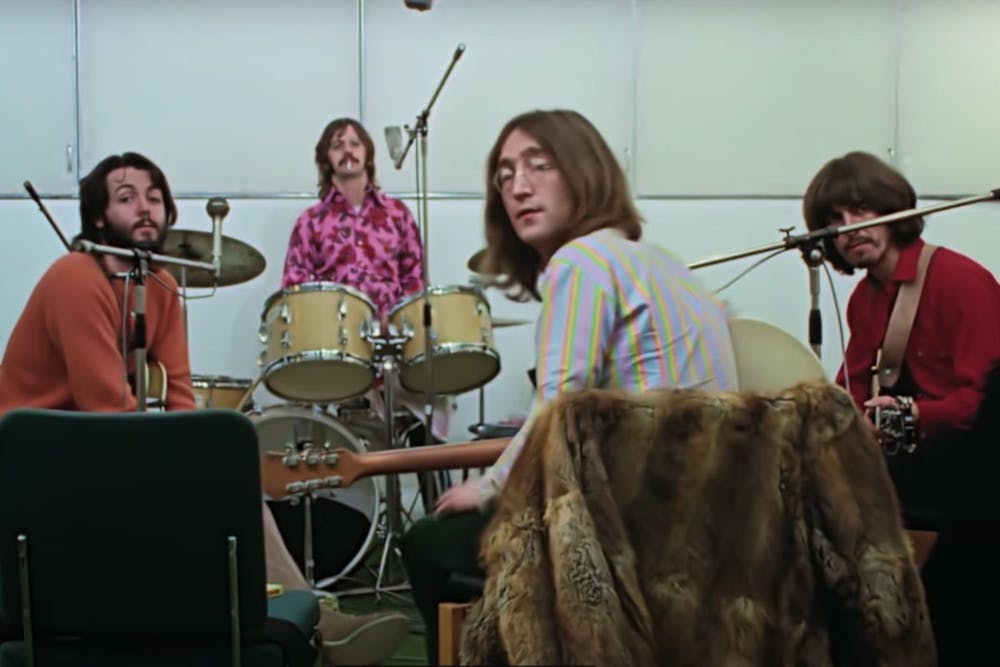“The Beatles: Get Back” is a feat of modern cinema. Spanning nearly eight hours and chronicling the development of one of the greatest albums of all time, this film pushes fans to reconsider how and why The Beatles broke up.
The footage was pulled from director Michael Lindsay-Hogg’s 1970 film, “Let It Be” and its unused recordings. Originally to be released as a TV special, “Let It Be” transformed into a documentary film capturing the development of the Beatles’ twelfth studio album by the same name.
When Jackson began looking through the footage, he stated, “I was thinking, I’d love to make a Beatles film, but I don’t want to make the Beatles-breakup film. That’s the one Beatles movie I would never want to make.” Jackson maintained this mindset throughout the film’s creation.
Watching the three-episode epic, I found myself transported to 1969. The series forms a 21-day diary into the world of The Beatles, beautifully restored. To achieve this, Jackson relied on film restoration techniques developed for his 2018 World War I documentary, “They Shall Not Grow Old.” After four years of editing and slowly cutting the massive archive of footage, “The Beatles: Get Back” emerged with vivid colors and powerful audio.
When Jackson described the film in an interview with Vanity Fair, he claimed it was “a documentary about a documentary.” Utilizing over 200 hours of untapped audio and video, Jackson challenges the narrative from the former documentary “Let It Be,” a film wrought with tension. In fact, the discord within “Let It Be” led many fans to conclude that the break-up was inevitable.
This is not to say that Jackson’s version is without conflict. Throughout, bassist Paul McCartney struggles to organize the band behind a live performance and towards the creation of their album. At another point, guitarist George Harrison walks out of the studio and briefly resigns from the band. Yet, at the same time, as Jackson himself points out, “that little episode has been taken and completely blown up by some people to represent acrimony between George and Paul and underlying severe tension. And in fact, it’s just a small little cloud which passes over their working relationship in five minutes.”
Compared to “Let It Be,” colored by and entrenched in such conflict, it is a new way to imagine and consider the album and the band itself. Taking place 18 months before The Beatles broke up, the footage seems much more humorous and cheerful than fans expected. This reality has led to numerous new theories as to why the band dissolved.
When former Beatles McCartney and drummer Ringo Starr watched the film, they found it “full of joy.” Starr claimed that the original documentary was “very narrow, built around a moment.” McCartney added to Starr’s statements, claiming “I love [Jackson’s version], I must say because it’s how it was. It just reminds me of – even though we had arguments, like any family – we loved each other, you know, and it shows in the film.”
Throughout the series and the three week recording period, as The Beatles struggled to come up with their final version of the album, audience members hear songs that would later appear on Harrison’s solo album “All Things Must Pass,” The Beatles’ “Abbey Road” and some from McCartney’s solo career. As Jackson himself states, “it was The Beatles doing these.”
The series concludes with The Beatles’ famous final January 1969 performance on the rooftop of Apple Corps headquarters. This performance took place after three years without any live performances from the band. After Starr and Harrison nixed the original TV performance and other concert venues, the band settled on the studio’s rooftop.
They began their performance at 12:30 PM when many of the surrounding businesses were on their lunch break. The concert was eventually broken up after 42 minutes by the Metropolitan Police. This final live performance takes on a new, much brighter light considering its framing within this 21-day inventive period.
Beautifully shot and transformative for Beatles fans around the world, “The Beatles: Get Back” invites you into the creative minds of McCartney, Lennon, Starr, and Harrison as they worked through one of their final albums. It challenges what we think of as a documentary and how we understand one of the greatest bands of all time. It is intimate, joyous, and all-around Beatles perfection.
Get The Chronicle straight to your inbox
Signup for our weekly newsletter. Cancel at any time.

